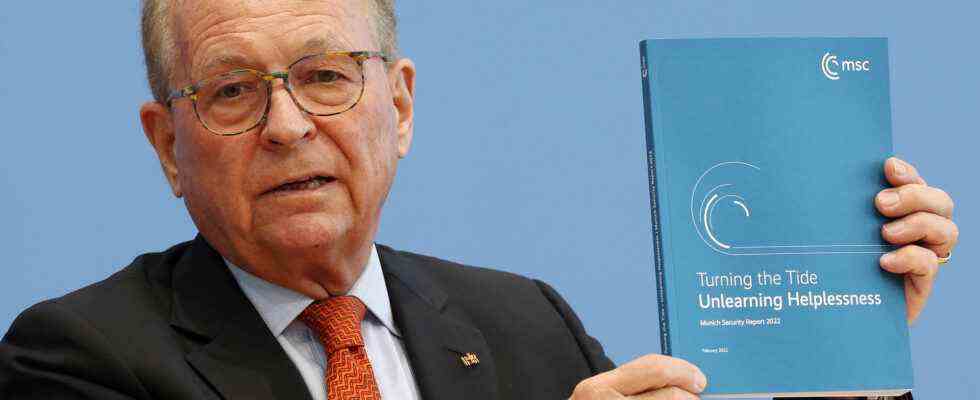Status: 02/14/2022 2:43 p.m
The head of the Munich Security Conference, Ischinger, considers a war in Ukraine to be avoidable. But the Munich Security Report paints a bleak picture for western democracies: there is a feeling of powerlessness.
The scenarios had become increasingly bleak in recent days: the United States warned that Russia could attack Ukraine at any time. And so the head of the Munich Security Conference was also asked whether war was already raging in Europe when this top-class discussion forum started on Friday. “I hope I’m not being naïve: I believe that war can be avoided,” was Wolfgang Ischinger’s response.
But he wasn’t quite sure, added the ex-diplomat. He attaches great importance to Chancellor Olaf Scholz’s visit to Moscow tomorrow: “I’m still hoping that, as a result of this visit, the Russian side might decide to continue the talks,” said Ischinger.
Hope for talks with Russia
He reminds us once again that this path of talks could ideally also lead the Russian side to Munich: This time – unlike in the past – Moscow has turned down all invitations to high-ranking politicians to the security conference. Ischinger named Russian Foreign Minister Sergey Lavrov, former President Dmitry Medvedev and Kremlin chief Vladimir Putin.
But Ischinger has not yet completely given up hope that talks could be held with Russia and not just about Russia this weekend. The former German ambassador to the USA was clearly trying not to burden the German chancellor’s trip to Kiev and Moscow with excessive demands.
warning to the German government
The controversial Nord Stream 2 pipeline? It is more of a long-term problem for German-American relations. One should not overstrain the goodwill of US President Joe Biden. And what about arms supplies to Ukraine? Please hang deeper as a topic, said Ischinger.
If the question now is whether military activities will break out in the next few hours or days, then corresponding considerations in the federal government are no longer particularly relevant, the ex-diplomat found. The deterrent effect of Ukraine’s existing defensive power will not change that significantly.
Even if the head of the Munich Security Conference has expressly praised transatlantic communication in the past few days in view of the Russian crisis – the perception in western democracies is one of powerlessness overall: “There is a feeling, here in Germany too, of a growing inability to shape things yourself, a growing helplessness.”
Bundling of many crises
From the point of view of Ischinger and the research director at the Munich Security Conference, Tobias Bunde, this is not only evident in the attempts to solve the Russia-Ukraine crisis. The overall increase in crises is accompanied by a perceived increase in the loss of control.
“We have the seemingly endless corona pandemic, the many floods, heat waves and droughts of the past year show that the effects of climate change have long been felt,” explained Bunde. Hopes of the international community to stabilize crisis regions in the long term have been disappointed. “Quite prominently in Afghanistan.”
The prospects are bad
“Unlearning helplessness” is what the authors titled the Munich Security Report this time. In other words, if Germany, Europe and the Western world accept their fate and no longer try to change anything, things will look bad for the planet.
In particular, the EU must “pull up on the belt” to counter this, warned Ischinger. Should it be possible to defuse the Russia-Ukraine crisis, that would certainly counteract the feeling of powerlessness.
War can still be avoided: Ischinger and Munich Security Report
Kai Küstner, ARD Berlin, February 14, 2022 at 1:34 p.m

